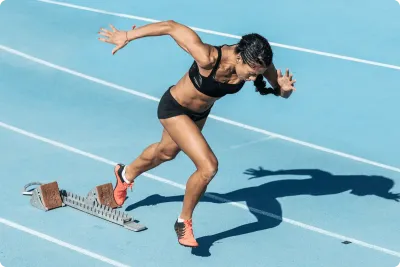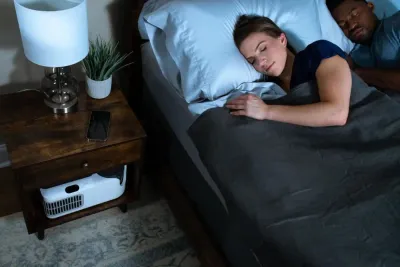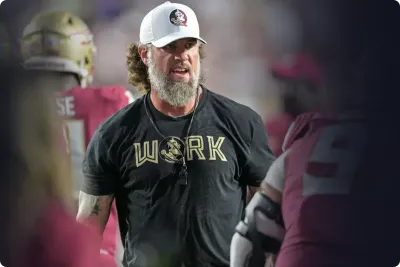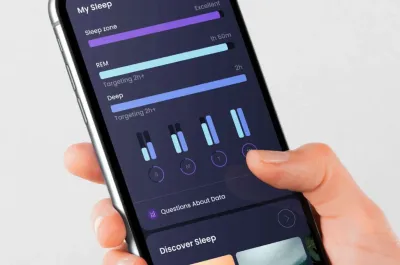
Key Takeaways
Poor sleep directly undercuts athletic performance by slowing the body, clouding the mind, and stalling recovery.
- Inadequate sleep reduces reaction time, accuracy, and endurance—skills athletes rely on to perform at their best.
- Missing quality rest limits muscle repair and growth by disrupting key recovery hormones.
- Sleep loss affects mental sharpness, lowering focus, motivation, and decision-making under pressure.
- Lower sleep quality increases injury risk by impairing coordination and slowing reflexes.
- Consistent, high-quality sleep is one of the most effective tools athletes have to support performance and recovery.
Whether competing at an elite level or simply staying active to promote overall health, sleep is vital to your athletic performance and muscle recovery. When you put your body through repetitive motions in sports, you increase the risk of associated injuries and fatigue.
Not only does sleep repair and rejuvenate the body to stimulate muscle growth, but it also sharpens the mind and boosts mental clarity to prepare your brain to learn and retain new skills.
Whether you’re a coach, an athlete, or purely an active individual, sleep is the greatest defense against many ailments that will hinder your ability to perform.
Below, you'll better understand the impact of sleep on athletic performance.
Improving Athletic Success Through Better Sleep
Sleep is a critical factor in athletic performance. It is essential for the physical and mental restoration of athletes. During sleep, the body undergoes muscle repair and recovery, which is crucial after intensive training.
This period is also significant for mental rejuvenation, impacting alertness and strategic thinking, which are also vital for athletes.
Read More: Peak Performance: The Role of Sleep in CrossFit
The deep sleep phase is critical. During this phase, human growth hormone (HGH), necessary for muscle growth and repair, is released. Poor or insufficient sleep can lead to decreased performance, as the body misses out on essential recovery time.
Proper training is crucial for athletes of all levels, but proper sleep training is just as important. Sleep acts as a complementary element that helps boost the benefits of training by consolidating physical exertion into tangible results.
Athletes, regardless of their level, should prioritize getting quality sleep to maintain optimal performance. Sleep duration and quality are important. Those who don’t get enough sleep are statistically less likely to perform at their best.
Uncover Your Athletic Potential with Quality Sleep
Ready to take your performance to the next level? Don't let inadequate sleep hold you back. Take a look at our award-winning cooling bed system designed for athletes like you, the Chilipad Dock Pro.

Sleep Deprivation in Sports
The impact of bad sleep on athletes is multifaceted and can significantly hinder their performance. Reduced coordination and reaction times are among the primary effects. Sleep deprivation can lead to slower reflexes and a decreased ability to perform complex physical tasks efficiently, required in most sports. This slowdown in response can be the difference between winning and losing.
Inadequate sleep affects physical and mental well-being and impairs cognitive functions, leading to a decline in strategic thinking and sound judgment. Athletes rely on their mental sharpness to make quick, strategic decisions during games or competitions. Lack of sleep can cloud this judgment, leading to poor choices that could affect the outcome of their performance.
Similarly, endurance and energy levels are significantly affected by poor sleep habits. Athletes require a high level of stamina and sustained energy, which are both compromised when they don't get enough rest. This decrease in endurance means athletes may fatigue faster, reducing their overall performance capability.
The body's ability to recover and rejuvenate through sleep is essential for maintaining the high energy levels required for athletic pursuits. With sufficient sleep, an athlete's overall capability to perform at their best is greatly improved.
The True Cost of Sleepless Nights for Athletes
A study focusing on runners revealed an intriguing insight: despite their bodies maintaining the same oxygen absorption capacity regardless of sleep deprivation, the runners experienced significantly heightened feelings of exhaustion. [1]
This increased sense of fatigue made their running efforts considerably more challenging than they would have been following a proper night's sleep before the race.
This finding is just a glimpse into the broader negative impacts of sleep deprivation. In a groundbreaking study on chronic sleep deprivation by Karine Spiegel, Rachel Leproult, and Eve Van Cauter, eleven men were subjected to a strict regime of only four hours of sleep per night for six continuous nights. [2]
During this period, a detailed analysis of various hormonal and metabolic markers was conducted daily, shedding light on the extensive physiological alterations caused by lack of sleep.
A common question is, how much sleep does an athlete need? Professional athletes typically require more sleep than the average person. Experts recommend that they get 8 to 10 hours of sleep every night.
However, the average adult should aim for 7 to 9 hours of sleep each night to avoid the negative effects of chronic sleep deprivation.
Student Athletes' Performance: Role of Sleep Management and Education
Experts are progressively stressing the need for heightened awareness and education about the significance of sleep for student-athletes. Educational institutions can improve their athletes' athletic performance and overall mental well being by implementing strategies.
These strategies include adjusting the training schedules to align with the natural sleep patterns of students, reallocating academic burdens to the off-season of sports, instructing about proper sleep habits, and routinely screening for sleep disorders.
Football players may have a higher prevalence of sleep apnea due to physical attributes, and swimmers may experience circadian rhythm problems due to early practice schedules. [3]

How Good Sleep Improves Athletic Performance
Sleep is important for everyone, regardless of whether they are athletes. Nevertheless, for athletes, it holds additional advantages. Most of our body's recovery and repair processes occur during sleep, which is particularly crucial for regular physical activity.
The importance of sleep extends far beyond simply recharging our energy levels, especially for athletes. Sleep quality is a cornerstone of elite athletes' performance, playing a critical role in recovery, mental sharpness, and overall physical health.
Related Blog: The Rise of Cold Plunge.
In the world of sports, where every second and every move counts, understanding and the benefits of sleep can provide a significant competitive edge. Below, we've highlighted the numerous advantages that sleep presents athletes, emphasizing why it's not just a rest period but a vital part of any serious athlete's training regimen.
Find how good sleep hygiene is crucial for athletes, enhancing recovery, performance, mental clarity, mood, injury prevention, and long-term health. This includes limiting the amount of blue light, using block out curtain, white noise makers, and more.
Improve Decision-Making
Scientists now even equate sleep deprivation to being intoxicated—you can essentially become impaired to the point where you appear and act "drunk" due to sleeplessness. [4] This serious lack of mental coordination can hurt performance and lead to a costly mental misstep when each moment counts.
Adequate sleep boosts cognitive functions like focus, making decisions, and split-second responsiveness, crucial for athletic success.
The Science Behind Cold Sleep
We know a thing or two about improving your sleep, and the #1 scientifically proven tip is that cold sleep is the best sleep! Cold sleep is critical for deep sleep – When the human body feels a temperature drop of about 2 to 3°F, it is easier to fall asleep faster and stay asleep longer.
Cold sleep benefits athletes by helping the body's natural sleep processes, enhancing the deeper stage of sleep, preventing overheating, causing fewer sleep disturbances, and improving overall sleep efficiency.
Related: Curious if a deeper issue is behind your restless nights? Learn more about sleep disorders and how recognizing common sleep disorders could be the first step toward better rest.
This translates into better recovery, improved performance, and overall well-being for athletes.
While it's important to prioritize your sleep, the key to your deepest sleep lies in temperature regulation. Keeping a cool sleep environment also ensures that excessive sweating only happens during your workouts, not during sleep.
"I've been using it all year, and I love it. I thought some of my guys, especially the offensive linemen that really conduct a lot of body heat in bed (could use it)." Von Miller, NFL Linebacker
Improves Reaction Time
When you have fractions of a second to react or make a decision on the next play, it's important to be mentally sound. Without sleep, the mind isn't able to easily consolidate memories (recall a play from a game film the day before) or absorb new knowledge (adjust to a new opponent).
Scientists took a group of tennis players and found that confining their sleep to 5 hours or less decreased serving accuracy by 53%. [5] For recreational and professional athletes alike, this number is staggering. Many athletes would have to work tirelessly to improve performance by even a few percent in a lifetime. Imagine taking away that hard work in a single night of poor sleep.

Reduced Risk of Injury
For many athletes, there is no greater fear than a potential injury during the season, which could shorten a career or disrupt a favorite form of exercise. When the same muscles get used repeatedly, the risk of fatigue and overuse injuries increases. In order to manage the chronic tear-down of muscle fibers, athletic performance relies on the restorative properties only sleep can provide.
Sleep, specifically non-REM or deep stage of sleep, is when the body produces human growth hormone and effectively repairs any micro-tears so muscle growth can occur. Without enough good sleep, the body does not move to muscle repair/growth as efficiently, and recovery is compromised.
The important link between recovery and performance cannot be overstated. A study looking at injury rates in high school athletes found that hours asleep was the strongest predictor of injury, even more than hours of practice. The likelihood of increased sports injuries increased. [6]
Sleep Adds Player Longevity
In addition to improving plate discipline for MLB players, great sleep naturally improves how well and how long they play. A former study by the American Academy of Sleep Medicine showed players' strike-zone judgment got worse over the course of an MLB season. [7]
For example, the study showed the rates were worse in September than in April for 24 out of 30 teams! [8] This means that almost all cognitive mistakes that happen on the baseball field are tied to fatigue -- the exhaustion just isn’t there in April. Sleep deficit develops over the course of the season for many professional baseball players.
Increased Energy Levels
During sleep, the body undergoes repair and restoration processes. It replenishes glycogen stores, the primary source of muscle energy, ensuring athletes have the stamina needed for rigorous activities.
Additionally, sleep regulates metabolic functions, aiding in the efficient conversion of food into energy. Sleep reduces physical and mental fatigue and ensures athletes remain alert and ready to train and compete at their best.
Boosts Immune System
In the professional sports world, coaches and trainers understand the restorative powers of sleep, including its role in strengthening the immune system. This knowledge is a significant reason why they research advanced sleep systems. The benefits of healthy sleep are immense and cannot be overstated, particularly in maintaining the health and well-being of players.
Despite enduring long hours in challenging conditions, extensive travel schedules, and considerable jet lag from constant movement, it's crucial for athletes to be well-rested. Adequate rest allows their bodies to replenish glycogen stores, increase human growth hormone (HGH) production, raise testosterone levels, reduce inflammation, and improve motor skill development, among other significant health benefits.
Another study found that adolescent athletes who slept more each night were 68 percent less likely to be injured than athletes who regularly slept less. [9]
It’s clear that the longevity of an athlete’s career relies heavily on the ability to reach and maintain deep sleep. Luckily, this is not insurmountable when you know how to move the body into a restful sleep and maintain a consistent and normal sleep schedule.
Final Thought
As you can see, adequate sleep is important for peak athletic and cognitive performance. The negative effects of insufficient sleep on the body are numerous and significant, including delayed response speed, decreased endurance, impaired coordination, and reduced mental focus.
As an athlete, you must prioritize your sleep as much as your training and nutrition to ensure you perform at your best.
You can improve your athletic performance and achieve your goals by taking care of your body with good sleep habits. So, please don't neglect the power of a good night's sleep, and give your body the rest it needs to excel.
Frequently Asked Questions About Sleep and Athletic Performance
Why Does a Lack of Sleep Affect Your Body’s Performance?
Sleep is a vital component of an athlete's success. It allows your body to repair and rebuild muscle tissue, crucial for recovery and performance enhancement. Lack of sleep impairs cognitive function, reaction time, and decision-making, all of which are essential for peak athletic performance.
Prioritizing sleep is not just about rest; it's an investment in your overall well-being and your ability to excel in your sport.
How Much Sleep Do Athletes Need?
Most athletes require between 7 and 9 hours of sleep each night, although the exact amount needed may vary based on the athlete's individual needs and the specific demands of their sport.
How Does a Lack of Sleep Specifically Affect Athletic Performance?
Poor sleep can lead to several problems that can impact athletic performance, including:
- Slower reaction times
- Decreased muscle strength and power
- Impaired coordination and balance
- Poor decision-making and concentration
- Increased risk of injury
What Are Some Tips for Athletes to Get a Good Night’s Sleep?
Athletes can take the following steps to help improve their sleep quality, such as:
- Establish a regular sleep schedule and stick to it as much as possible, even on weekends.
- Create a relaxing bedtime routine.
- Make sure your bedroom is dark, quiet, and cool.
- Limit caffeine
Everyone's sleep needs are different, so experiment with these tips and see which ones work best for you.
Learn more about the best mattress for athletes!
Peer-Reviewed Research References
-
Azboy, O., & Kaygisiz, Z.
Effects of Sleep Deprivation on Cardiorespiratory Functions of Runners and Volleyball Players.
Acta Physiologica Hungarica, 2009.
Study Type: Controlled Exercise Physiology Study
Key Finding: Sleep deprivation negatively affected cardiorespiratory responses during rest and exercise, impairing physical performance and recovery in trained athletes.
View Study
Source URL: https://doi.org/10.1556/APhysiol.96.2009.1.3
-
Van Cauter, E., Spiegel, K., Tasali, E., & Leproult, R.
Metabolic Consequences of Sleep and Sleep Loss.
Sleep Medicine, 2008.
Study Type: Physiological & Metabolic Review
Key Finding: Sleep loss disrupts glucose metabolism, appetite-regulating hormones, and energy balance, increasing metabolic risk and impairing physical performance.
View Study
Source URL: https://www.ncbi.nlm.nih.gov/pmc/articles/PMC4444051/
-
Charest, J., & Grandner, M. A.
Sleep & Athletic Performance.
Sleep Medicine Clinics, 2020.
Study Type: Narrative Review
Key Finding: Inadequate sleep negatively affects physical and mental performance, increases injury risk, slows recovery, and impacts athlete mental health.
View Study
Source URL: https://www.ncbi.nlm.nih.gov/pmc/articles/PMC9960533/
-
Williamson, A. M., & Feyer, A. M.
Moderate Sleep Deprivation Produces Impairments Equivalent to Alcohol Intoxication.
Occupational and Environmental Medicine, 2000.
Study Type: Controlled Cognitive & Motor Performance Study
Key Finding: Moderate sleep deprivation impaired cognitive and motor performance to levels comparable with legally defined alcohol intoxication.
View Study
Source URL: https://www.ncbi.nlm.nih.gov/pmc/articles/PMC1739867/
-
Watson, A. M.
Sleep and Athletic Performance.
Current Sports Medicine Reports, 2017.
Study Type: Clinical Sports Medicine Review
Key Finding: Adequate sleep is essential for peak athletic performance, injury prevention, reaction time, and training adaptation.
View Study
Source URL: https://doi.org/10.1249/JSR.0000000000000418
-
Averitt, J.
Sleep, Fatigue, and Athletic Performance.
Digital Commons @ Georgia Southern, 2022.
Study Type: Academic Institutional Research
Key Finding: Sleep quantity and fatigue levels were closely linked to performance outcomes, recovery capacity, and perceived exertion in athletic populations.
-
American Academy of Sleep Medicine.
Fatigue and Sleep Linked to Major League Baseball Performance and Career Longevity.
ScienceDaily, 2013.
Study Type: Sports Performance Research Summary
Key Finding: Sleep duration and fatigue were associated with performance metrics and career longevity among professional baseball players.
-
Celmer, L.
Studies Link Fatigue and Sleep to MLB Performance and Career Longevity.
American Academy of Sleep Medicine, 2013.
Study Type: Science Communication & Research Summary
Key Finding: Chronic sleep loss and travel-related fatigue negatively influenced reaction time, consistency, and long-term performance in professional athletes.
-
ScienceDaily.
Lack of Sleep Tied to Teen Sports Injuries.
ScienceDaily, 2012.
Study Type: Epidemiological Research Summary
Key Finding: Adolescents who slept fewer hours per night had significantly higher rates of sports-related injuries, highlighting sleep as a key injury-prevention factor.
View Study
Source URL: https://www.sciencedaily.com/releases/2012/10/121021102814.htm









